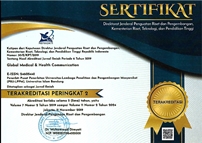Religiosity and Stress on Nurses during COVID-19 Pandemic at a Hospital in Bandung
Abstract
The problem of the coronavirus disease 2019 (COVID-19) pandemic has resulted in changes in various aspects of life, primarily related to health services. All health workers involved in handling COVID-19 are likely to experience psychological pressure in treating COVID-19 patients with an increasing number of patients. The correlation between religiosity is expected to guide an individual in interacting in the work environment, including in health services and managing stress on nurses. This study aimed to analyze the correlation between religiosity and stress at work during the COVID-19 pandemic in nurses. This research is an observational analytic with a cross-sectional approach. Primary data was obtained from a questionnaire to 78 nurses in the COVID-19 ward at a hospital in Bandung in August 2021. The Pearson correlation test analysis results showed a significant correlation between religiosity and stress. Religious maturity can influence a person's level of mental maturity. It can give a feeling of peace in the heart so that a person can avoid feeling restless and anxious about the problems faced without stress.
Keywords
Full Text:
PDFReferences
Satuan Tugas Penanganan COVID-19. Situasi virus COVID-19 di Indonesia [Internet]. Jakarta: Satuan Satuan Tugas Penanganan COVID-19; 2020 [cited 2020 December 20]. Available from: https://covid19.go.id/situasi.
World Health Organization. Archived: WHO Timeline - COVID-19 [Internet]. Geneva: World Health Organization; 2020 [cited 2020 December 25]. Available from: https://www.who.int/news/item/27-04-2020-who-timeline---covid-19.
Hamdi I, Silaban MW. Rumah sakit rujukan overload, pemerintah diminta serius tekan penularan Covid-19. Tempo.co [Internet]. 2020 August 12 [cited 2021 January 31]. Available from: https://metro.tempo.co/read/1374996/rumah-sakit-rujukan-overload-pemerintah-diminta-serius-tekan-penularan-covid-19.
Cai H, Tu B, Ma J, Chen L, Fu L, Jiang Y, et al. Psychological impact and coping strategies of frontline medical staff in Hunan between January and March 2020 during the outbreak of coronavirus disease 2019 (COVID-19) in Hubei, China. Med Sci Monit. 2020;26:e924171.
Moghanibashi-Mansourieh A. Assessing the anxiety level of Iranian general population during COVID-19 outbreak. Asian J Psychiatr. 2020;51:102076.
Mo Y, Deng L, Zhang L, Lang Q, Liao C, Wang N, et al. Work stress among Chinese nurses to support Wuhan in fighting against COVID-19 epidemic. J Nurs Manag. 2020;28(5):1002–9.
Moustaka E, Constantinidis TC. Sources and effects of work-related stress in nursing. Health Sci J. 2010;4(4):210–6.
Huang C, Wang Y, Li X, Ren L, Zhao J, Zang L, et al. Clinical features of patients infected with 2019 novel coronavirus in Wuhan, China. Lancet. 2020;395(10223):497–506.
Allsopp K, Brewin CR, Barrett A, Williams R, Hind D, Chitsabesan P, et al. Responding to mental health needs after terror attacks. BMJ. 2019;366:l4828.
Andriyani J. Terapi religius sebagai strategi peningkatan motivasi hidup usia lanjut. J Al-Bayan. 2013;19(2):31–42.
Umar M. Urgensi nilai-nilai religius dalam kehidupan masyarakat heterogen di Indonesia. J Civic Educ. 2019;3(1):71–7.
Manurung S. Islamic religiosity and development of zakat institution. QIJIS. 2013;1(2):197–210.
Saputro I.W. Konsep tauhid menurut Abdul Karim Amrullah dan implikasinya terhadap tujuan pendidikan Islam. At-Ta’dib. 2016;11(2):259–84.
Tayyib NA, Alsolami FJ. Measuring the extent of stress and fear among registered nurses in KSA during the COVID-19 outbreak. J Taibah Univ Med Sci. 2020;15(5):410–6.
Prasetyo H, Anitra V. Pengaruh religiusitas terhadap kinerja karyawan: studi pada tenaga kependidikan Universitas Muhammadiyah Kalimantan Timur. BSR. 2020;2(1):705–13.
Fitriani A. Peran religiusitas dalam meningkatkan psychological well being. Al-Adyan. 2016;11(1):57–80.
Mayasari R. Religiusitas Islam dan kebahagiaan (sebuah telaah dengan perspektif psikologi). Al-Munzir. 2014;7(2):81–100.
Warsiyah. Pembentukan religiusitas remaja muslim (tinjauan deskriptif analitis). Cendekia. 2018;16(1):19–40.
Rahmawati HK. Kegiatan religiusitas masyarakat marginal di Argopuro. Community Dev. 2016;1(2):35–52.
Muslim M. Manajemen stress pada masa pandemi Covid-19. Esensi. 2020;23(2):192–201.
Yudra FO, Fikri, Hidayat A. Hubungan antara religiusitas dengan stres kerja pada anggota Brimob Polda Riau. An-Nafs. 2018;12(1):12–21.
Rajkumar RP. COVID-19 and mental health: a review of the existing literature. Asian J Psychiatr. 2020;52:102066.
Yupartini L, Rustiawati E, Sulastri T. Stres kerja dengan perilaku caring petugas kesehatan dalam penanganan pasien pada masa pandemi Covid-19. JKS. 2021;4(2):683–9.
Handayani RT, Kuntari S, Darmayanti AT, Widiyanto A, Atmojo JT. Faktor penyebab stres pada tenaga kesehatan dan masyarakat saat pandemi Covid-19. JKJ. 2020;8(3):353–60.
Utama IKAB, Surya IBK. Pengaruh religiusitas, adversity quotient dan lingkungan kerja non fisik terhadap stres kerja. E-J Manaj. 2019;8(5):3138–65.
Bashori MF, Meiyanto IJKS. Peran job insecurity terhadap stres kerja dengan moderator religiusitas. Gama JoP. 2017;3(1):25–36.
Darmawanti I. Hubungan antara tingkat religiusitas dengan kemampuan dalam mengatasi stres (coping stress). J Psikol Teori Terap. 2012;2(2):102–7.
DOI: https://doi.org/10.29313/gmhc.v10i1.8573
pISSN 2301-9123 | eISSN 2460-5441
Visitor since 19 October 2016:
Global Medical and Health Communication is licensed under a Creative Commons Attribution-NonCommercial-ShareAlike 4.0 International License.































.png)
_(1).png)
_(1).jpg)
